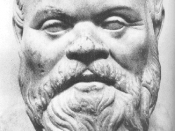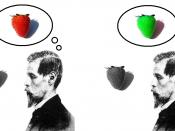Can physicalism account for qualia? Physicalist theories of mind presented a new alternative for those who rejected dualism yet could not bring themselves to endorse behaviourism. Proposing that that mental events are physical ones, physicalist theories lack the mystical quality of dualist explanations of mind, and avoid behaviourism's greatest flaw: the complete denial (or glossing over) of inner mental life. Simple introspection seems to make the denial of this inner mental life quite ridiculous - all philosophers are familiar with Descartes' Cogito Ergo Sum (2006). However, as with behaviourism, this inner mental life creates a difficult obstacle for physicalism to surmount. In particular, one aspect of mental phenomena, called "qualia" (singular "quale"), has caused problems for physicalism. Qualia capture the subjective, phenomenological, part of mental life. These problems have seen many incarnations; those posited by Jackson (1982), Nagel (1974) and Kripke (1971) are perhaps the most famous and well-stated of these.
Frank Jackson constructed a thought experiment to attempt to show that one can have all the physical facts about something yet still gain new information in the experiencing of it. Thomas Nagel focused on point of view to try to show that an objective theory cannot capture subjective facts. Kripke did not not strictly put forward an argument from qualia, but rather from the nature of identity. Nevertheless his argument attempts to show that qualia cannot be identified with a physical state. All three arguments try to prove the impossibility of current physicalist theories accounting for qualia; their varying success (and failure) will be discussed. Even if these arguments are fallible, it does not necessarily mean that we will ever gain a satisfactory physicalist account of qualia (or any other account); McGinn (1989) proposes this idea, putting forward an argument reminiscent of Godel's incompleteness theorems (Heil, 2004, p.756). There...


